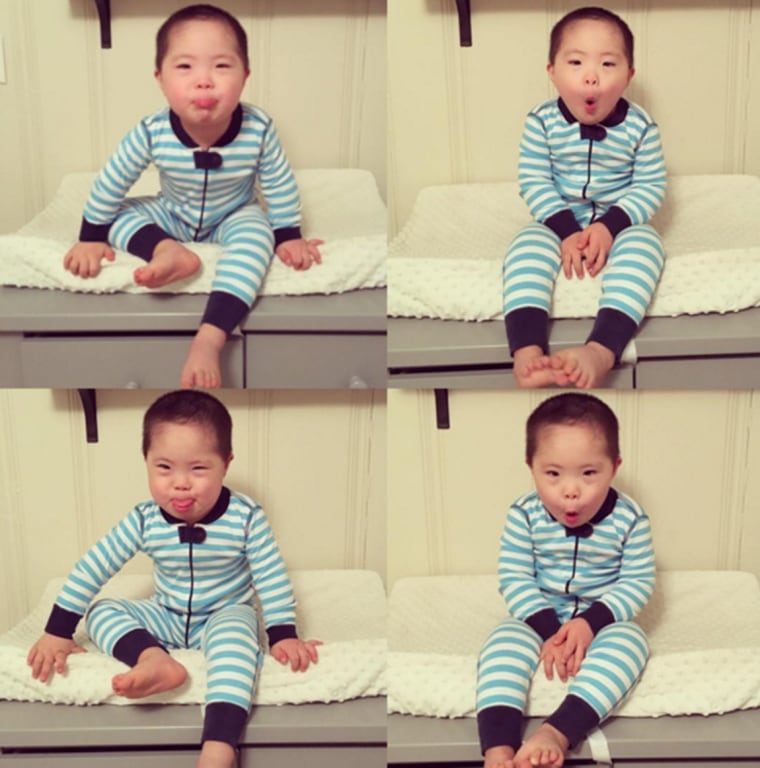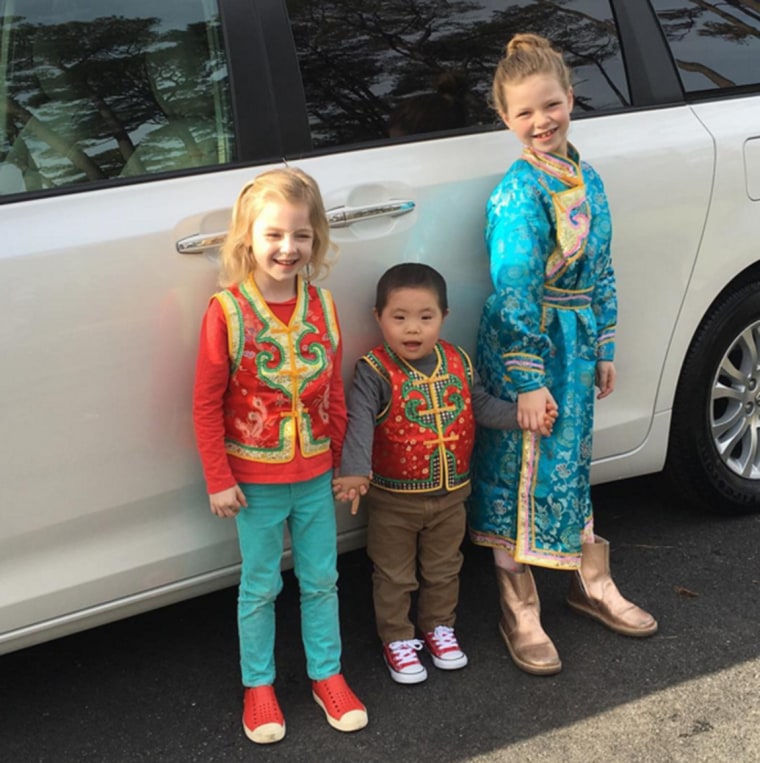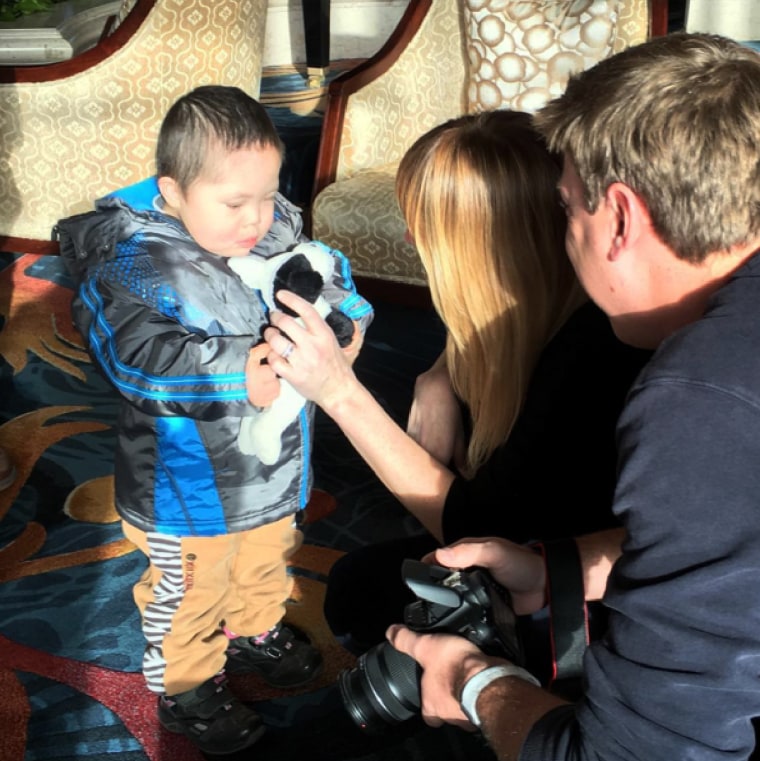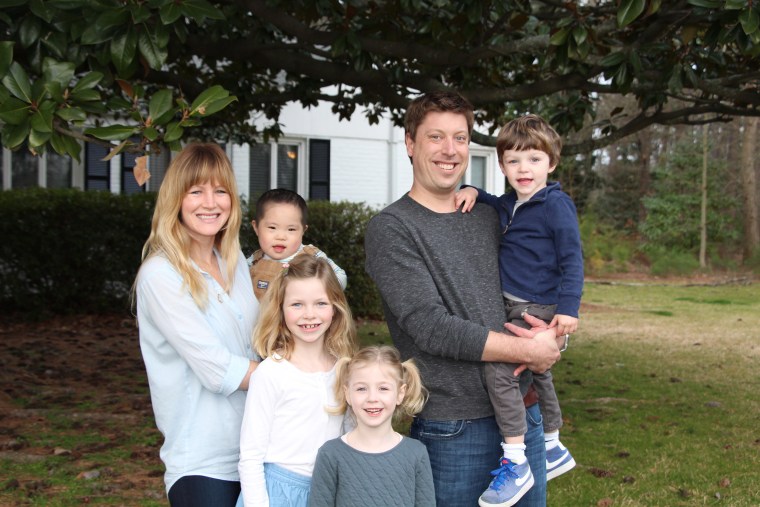He was one of the lucky ones. In three short years, Ben went from being abandoned in a field near a water pumping station in a village in inner Mongolia to living in a cozy home with sisters and a brother, 7,000 miles away.
The local paper wrote about Ben when he was found about a day after he was abandoned, on Oct. 17, 2013. He was a chubby-cheeked boy believed to be about one year old.
The facility in Bayannur that took Ben in learned he had been born with a heart defect and Down Syndrome. Most of the children who, like Ben, are abandoned and placed in China’s social welfare system today have special needs — a shift due in part to a stronger economy, the phase-out of the one-child policy, and a change in the country's cultural preference for sons over daughters.
China’s image as a destination for international adoptions of healthy, young girls has changed gradually over the past decade. But for kids like Ben with individual needs still living in orphanages across the country, the need for inter-country adoptions remains strong.

Mary Moo, vice president of the non-profit adoption agency WACAP, has seen this change firsthand.
“When you visit China, you see these kids they think no one wants,” Moo told NBC News.
Ten years ago, she said, the majority of adoptable children were girls who had been abandoned due to the one-child policy. China had “by no means the number of special needs kids we see now,” she added.
“One thing that never ceases to amaze me, after a child is adopted, how much they blossom."
“I would say the changing of the one-child policy was a milestone for things that were happening internally for years,” said Moo, who was been with WACAP since 1991. The policy was in place for more than 30 years and began to be formally phased out last year.
Since 1999, Americans have adopted more than 73,000 Chinese orphans, 88 percent of whom are girls. But, year after year, the numbers dramatically dropped. Nearly 5,500 kids were adopted in 2007, while in 2013 that figure went down to 2,306. The move has also led to an increase in domestic adoptions.
The wait time to adopt a healthy child from China today is at least five years. For a child with an individual need, however, the process may take less than two years.
Lindsey, 33, and Daniel Strickland, 36, had always wanted to adopt. But after the Virginia Beach couple had their third child, a son named Jack, they suddenly felt overwhelmed.
Jack, now 3, showed symptoms of childhood apraxia of speech and required speech therapy. The Stricklands wondered whether it was better to wait to introduce a new member to their brood.
“It was scary at first,” Lindsey Strickland told NBC News. The couple eventually decided the moment was ripe while their children — aged 3, 5 and 7 — are still young and the adoption would not disrupt their lives.

They decided to look at China because it had the easiest-to-follow adoption process, Daniel said.
A former babysitter who had started working at WACAP introduced them to the process. Lindsey said going through the files of abandoned children was “agonizing.” But Ben’s energy and playfulness caught their eye. He was named Nelson at the time, Lindsey’s father’s middle name, which they took as a sign.
“When you visit China, you see these kids they think no one wants."
“This is what is meant to be,” Lindsey said. “Faith played a big role.”
At the time, Ben was living at New Day Foster Home in Beijing, where he had been referred to by his custodial orphanage to receive a life-saving heart surgery. New Day first opened in 2000 and provides medical care free of charge to Chinese orphans in its three facilities. The agency gets its funding from donations, both from individuals and corporations. It doesn't facilitate adoptions, but it cares for kids whose conditions need assistance beyond the scope of the resources of a government-run orphanage.
“Orphanages are very limited in their resources in many areas,” New Day Director Karen Brenneman told NBC News, adding that some places are only allotted about $150/month per child. “We always have a waiting list.”
Some kids live with foster families in their homes and come to the New Day facility for programs and checkups, but Ben lived in the facility full-time. With access to professional medical care, speech and physical therapy, Ben flourished at New Day.
“He was a star,” Brenneman said.
And the photos the Stricklands saw on New Day’s blog captured that sweetness and mischief.
What followed was a 15-month bureaucratic blur for the family: filling out forms, filing documents, paying fees, matching adoption requirements both at home and in China, dealing with immigration, receiving home visits from social workers, and, finally, making their first trip ever to China to pick up Ben and bring him home.
What has happened since is what the Stricklands call their “adoption adventure.” They've bought a minivan to accommodate the entire family and they celebrated the Lunar New Year for the first time. Ben became a U.S. citizen when he landed in January at Newark Liberty International Airport. He loves to eat anything and everything and play with his new siblings, who have fully embraced him. There’s a yard for him to run around in, and in the summer, the beach is just a short walk away. Lindsey said Ben’s two sisters and brother also like to pray for their new little brother.

“They adore him,” she said, adding that the biggest issue has been Ben getting a break from constant playtime. Medical visits for heart checkups have continued, but Ben’s doctor thinks he will be a success story.
Brenneman, whose agency has helped 300 kids since it opened, said the best part comes once a child goes to his forever home.
“One thing that never ceases to amaze me, after a child is adopted, how much they blossom,” she said.
Follow NBC Asian America on Facebook, Twitter, Instagram, and Tumblr.

